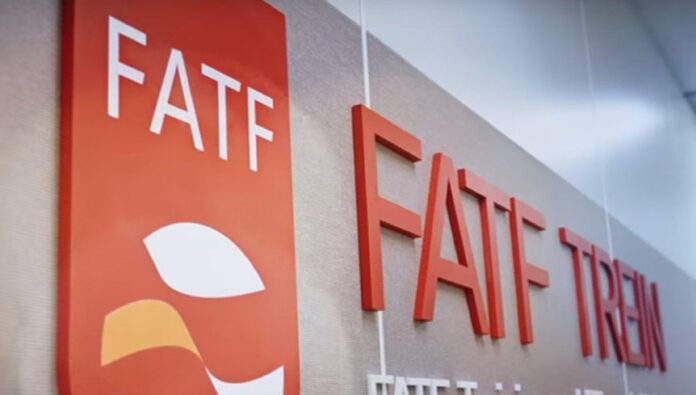Since 2018, the news cycles have been dominated by Pakistan’s status under the Financial Action Task Force (FATF). On October 25th this year, similar scenes played out on television screens as before. Heaping praise on Pakistan once again for trying to comply with the FATF’s action plan, the financial watchdog still did not give the country the all-clear, keeping it on its grey-list and giving it until February 2021 to comply with the all of the FATF action plan.
The signs are hopeful ones. Pakistan has repeatedly been kept in the grey-list, but with every appraisal, it has inched towards the green signal, and more importantly, has not fallen back at any point. Still the process has been a slow and daunting one.
But despite the looming sword that the FATF has been since Pakistan got grey-listed in 2018, there is still very little understanding in the general populace about what the consequences of being blacklisted is, or why Pakistan was even put on the grey-list in the first place. Profit looks back at the causes and consequences of Pakistan’s grey-listing, and what the action plan to get out of it entails.
Not the first time
FATF has been around since 1989. A G-7 initiative, the intergovernmental organization was responsible for developing policies to help combat money laundering, promote effective implementation of legal, regulatory and operational measures regarding threats to the integrity of the international financial system.
Initially, this was the extent of the organization’s role. In 2001, after the fall of the World Trade Center on September 11, the organization saw a significant increase in its responsibility when it was also made responsible for keeping track of terrorism financing.
Terrorist operations like Al-Qaeda are large operations that require money. This money comes from rich sympathisers as well as governments, and the FATF’s new job was to identify who was responsible, and curb terror financing.
So after 9/11, terrorist organizations, their sources of financial resources, their assets, sympathizers, supporters, sustainers, financial transactions as well as the financial activities in countries caught in the crosshairs of the war of terror became the business of the FATF.
As one of the countries caught in said crosshairs, Pakistan was first grey-listed by the FATF back in 2008 for a brief period, but quickly came out of it. The grey-listing happened again in 2012, and this time stayed until 2015. This one had come as a result of a 2012 report by th 41-country organization, which recommended controlling the financial flow to terrorist organizations with its Asia Pacific Group to deal with the countries of this region. Pakistan was suspected to be one of the countries where strict anti-money laundering and counter-terrorist financing measures were to be taken based on the 2012 FATF recommendations.
However, perhaps the most curt grey-listing was in June 2018, the current one, because Pakistan was only given 15 months to implement the terms of the FATF action plan.
Therefore, in October 2018, the world financial watchdog put in place a formidable group of financial, legal and law enforcement experts from nine countries/organizations including Maldives, Indonesia, China, UK, US, Turkey, New Zealand, Australia, and IMF to evaluate Pakistan’s case. The argument since then has been that the countries chosen to look into Pakistan’s case are hostile to Pakistan. However, this is grasping at straws, especially since the data and information used to make the judgement to these countries was provided by Pakistan, and gathered physically by experts making on-site visits also. The document came to be known as the Mutually Evaluated Report (MER).
As many observers and analysts pointed out, the report came out as a gigantic graphic indictment of the failed Pakistan system, its broken laws, lack of commitment and coordination. It was largely divided into two parts – Terror Financing and Money Laundering. The MER is so detailed and goes into every small and minuscule aspect of money laundering as if the experts had put Pakistan under a super-powerful microscope and found each and every fault, crack, cleavage, and a hole in its legal, administrative, judicial, security and political infrastructure and how it was deliberately destroyed by corrupt and selfish leaders’.
The Report says that “overall the public and private sectors have a low level of understanding of money laundering and terror financing risks in the country. This is also apparent across law enforcement agencies (LEAs) due to the lack of national coordinated strategic leadership. Bank operations were found full of shortfalls with the State Bank failing to perform its supervisory duties; how Hawala and Hundi were used; how personal carriers were employed to transfer money; and how hides and skins of sacrificial animals were used to finance terrorism and launder illegitimate wealth.”
The Hawala and Hundi system is an alternative remittance system. Hawala is an ancient system originating in South Asia, and is today used around the world to conduct legitimate remittances. Like any other remittance system, hawala can, and does, play a role in money laundering. Similarly, corruption surrounding hides and skins of sacrificial animals and the politics surrounding their collection, as well as money laundering cases through personal carriers such as in the Ayyan Ali case have all been open secrets.
How we got here
According to former Ambassador M Alam Brohi, the recent harsh grey-listing has come because the FATF has grown tired of Pakistan’s non-compliance. “The recommendations of the FATF had been lying unattended with the previous two democratic regimes since 2012. No anti-money laundering or counter-terrorist financing legislation was made. The Hawala or Hundi system was in full swing. A former President himself was involved in a case with a personal carrier, the FATF had no other choice but to grey-list Pakistan again, and this time more seriously,” he told Profit.
He maintains that the ill-gotten wealth, accumulated by corruption, drug trafficking, fraud, tax evasion, smuggling, human trafficking, and organized crime, was laundered through these extra banking channels, inflating bank accounts and financing purchases of properties abroad. “No legislation was made to stem money laundering or control the informal banking transactions,” he says. “The MER discloses that from 2013-2018, a total of 2,420 cases of money laundering were investigated by concerned agencies. Out of which 354 were prosecuted. Only one case, investigated and prosecuted by NAB resulted in a conviction.”
“The MER, while making 40 recommendations, elaborately concluded whether Pakistan had complied, not complied, or partially complied with the recommendations. The verdict of the FATF experts was simply awful for the rulers of the country who had acted in bizarre ways totally inimical to the national interests.”
In summary, the conclusion claimed that Pakistan had definitely made strides towards rooting out terrorism. Terrorism and terror financing was tackled in two elaborate operations, Zarb-e-Azab in the erstwhile FATA and North-West region of Pakistan, and Radd ul Fasad, which mostly targeted terrorist sleeper cells in the Punjab and other urban centers all across the country. However, this military action was not proportionately supported by foolproof measures by the civilian rulers.
The Report stipulates that out of 40 observations, only one recommendation was judged as ‘compliant’, and that was ‘Financial institutions Secrecy Laws.’ Nine recommendations were treated as ‘largely compliant’ with multiple inconsistencies and shortcomings in the system. Partial compliance rating was given to 25 recommendations which covered every aspect of the country’s failure to check money laundering and terror financing.
This was back in the initial grey-listing, and it was these largely unfulfilled recommendations that the PTI inherited when it came to power. “The Damocles sword of FATF was hanging over the head of the country, which had every possibility of being placed on the blacklist. The PTI regime had to comply with over 27 recommendations within a short span of time as the deadlines for compliance in all respects had already expired,” he says.
“The PTI regime took the matter more seriously than its predecessors. However, it did not have the needed strength in the Parliament particularly in the Senate to pass legislation to comply with the recommendations of the FATF. The opposition was not cooperating with the regime and allegedly wanted to have some reprieve in the money laundering cases instituted against them notwithstanding the crucial meeting of the FATF being held in Paris from 21-24 October.”
The Bills of the requisite legislation were with the Standing Committees of the National Assembly for quite some time, as the opposition wanted to use the government’s desperation to get the bills passed before the FATF joint session to their advantage. However, the government just managed to pass an anti-money laundering bill before the joint session.
The global financial watchdog, after its three-day huddle in Paris, came out with its verdict on Pakistan which was bittersweet. Though the country has been retained on the increased monitoring list (better known as the grey-list), Pakistan was found to have complied with 21 recommendations of FATF as announced by Dr. Marcus Pleyer, President of the Financial Watchdog.
While praising the country for progress, he categorically declared it safe from the black list, giving it time up to 21 February 2021 to comply with the remaining recommendations, which are mostly to do with Anti Money Laundering and Counter Terror Financing. To comply with these 21 recommendations within these 15 months was no easy task, and the government does deserve some applause and recognition for it.
Ambassador Brohi says this should give us hope that the danger of the country landing into the black-list has been offset. However, with this comes the most difficult part of the FATF recommendations. The regime has to show an equally high level of commitment, which is going to be judged by the measures it takes to implement the four crucial and strategic tasks specified by the FATF.
It is now imperative on the country’s leadership to cooperate and strengthen laws related to money laundering and counter terrorism financing. And the leadership here does not just mean the government, because the opposition here has an important role to play. The leadership of the country both ruling and opposition, should realize their duty to the country and cooperate. The success of the government depends on getting the FATF recommendations completed, and the opposition may again want to use their numbers in parliament to get things out of the government in exchange for voting for these laws. However, they must understand that the greater interest of Pakistan must come first before what they think they may be able to gain out of this.
The strategic areas that need cooperation include demonstrating that law enforcement agencies are identifying and investigating the widest range of terror financing activities, as well as addressing strategic deficiencies by ensuring that terror financing prosecutions result in effective, proportionate and dissuasive sanctions. Other than this, the FATF also wants to see that there is effective implementation of targeted financial sanctions against all designated terrorists, and that the enforcement against violations of targeted financial sanctions, including in relation to non-profit organizations is ensured.
“The main hurdle in implementing the above strategic tasks, from what I can see, is the infamous lethargy, inertia and endemic corruption of our law enforcement agencies, and the concomitant, half hearted, implementation of anti-money laundering laws, and the traditional laxity of our administrative and financial institutions at the federal and provincial levels,” says Ambassador Brohi.
The challenge ahead
With all that has gone on, Pakistan may finally be at the edge of success with the FATF. It has been a long road, and now, the only thing that matters is the February 2021 deadline and what that review will say. The government is desperate to untangle itself by then, especially if it is to have a relatively peaceful second half of its term in power.
According to the official sources, Islamabad has made substantive progress on the FATF entrapment, fulfilling 21 conditions of the 27-point action plan set forth by the global terrorist funding and money laundering watchdog. However, the FATF will not budge until the final six conditions are also fulfilled.
To this end, Pakistan has to take strict action against terrorists and their organizations including Hafiz Saeed and Maulana Masood. These figures have been harboured for long in Pakistan because of its proxy war with India.
The FATF has urged Pakistan to “move swiftly” as “all action plan deadlines have expired,” suggesting the likelihood of it being downgraded into the dreaded blacklist if all remaining action plan points are not satisfactorily complied with before the next review meeting. Pakistan cannot afford any such outcome, and therefore it must not lose the momentum that has enabled it to go from largely addressing only five points by October of last year, to 21 points within 12-months, with no points left unaddressed.
Speaking to Profit, Former Ambassador Wajid Shamsul Hasan says if Pakistan is able to deliver the FATF with all the points, it will then conduct an on-ground inspection to assess how well the action plan is being implemented, especially in regards to its dealing with the terrorist groups still supported clandestinely by Pakistan and its intelligence networks.
“To achieve that end and their possible elimination, it is imperative for all relevant authorities and institutions, including the intelligence agencies, to be confident in their ability to actively demonstrate that the action plan that has so far been fulfilled on paper is also being implemented largely in the real-time drawing board,” he says.
“There is no doubt that India has made an all-out strong diplomatic push, using its influence at the FATF to try and get Pakistan black-listed, but this has proven impossible up until now because Pakistan has support from China, Turkey, Saudi Arabia, Malaysia, and now Australia, which is why it has, despite making very poor progress in the initial stages, avoided being placed in the blacklist for almost two years.”
Now, however, even these allies cannot hold the gate for much longer, which is why the incumbent government made such a push to get these 21 points complied with. It should also be noted that earlier this year, China sternly warned Pakistan that if it didn’t get its act together and start making better and quicker progress on the action plan, it would become difficult for Beijing to continue providing Pakistan with support.
It must be noted that Pakistan’s Minister for Industries and Production Hammad Azhar commenting on Financial Action Task Force’s (FATF) decision to keep Pakistan on the grey list described it as a “diplomatic victory” for the country when according to experts it was neither here nor there—rather everything seemed to on the limbo.
The Minister claimed “FATF has acknowledged Pakistan’s high-level political commitment and significant progress made by it in settling 21 points out of 27 before it found itself getting on grey list. The Minister has blown what he calls a consensus decision without any voting as Pakistan’s diplomatic victory. Thus, no voting criteria (for any voting numbers) were applied, says Hammad Azhar in his official Twitter handle on Saturday.
Hammad Azhar blamed India as some circles propagating “false and baseless information” about abstention or negative voting in the meeting. “Some countries mentioned in the fake news are not even members of FATF. Pakistan enjoys broad international support and cooperation on FATF,” he said in another tweet.
This, of course, is in the government’s best interest. The truth is, Pakistan neither had a diplomatic victory nor a loss this October. Simply speaking, it was another lifeline, and one that might be the final one. With dwindling international support, there is no choice but to put our house in order, or suffer the consequences.
Financial experts believe that FATF matters need to be resolved urgently, otherwise there could be much trouble just ahead with regards to obtaining financing and loans from the international financial market. And since the country runs primarily on borrowed money, it will find its core functioning compromised very soon if external funding suddenly dries, which is only imminent.
Experts say that the government must go right back to the drawing board. It has long been accusing the opposition of politicizing this issue by allegedly associating it with relief for their leaders when it comes to their accountability trials. If such accusations are indeed true, then the opposition must get its act together because political disagreements, even the strongest ones, are best handled around issues that remain within the country and do not affect anything that can hurt the people.
When asked about FATF’s decision to keep Pakistan on its grey list until February 2021, the country’s leading tax consultant and an expert on International Laws, Dr. Ikramul Haq, tells Profit that the decision to keep Pakistan under monitoring on the grey list is because the government made hasty legislation.
“The most vital issue is the role assigned to Anti-Money-Laundering and CFT authorities. These amended laws give powers to regulate AML-CFT to various governmental and professional bodies. This law was not drafted carefully. It creates conflict of interest as well.”
Dr Haq believes this law puts a burden on them to counter money laundering and terrorist financing that is a professional conflict situation. It also empowers professional bodies to act as appellate authority. This violates the principles of independence and is vulnerable to conflicts of interest.
“Our men in the ministry of law and elected members sitting in parliament were not careful to remove these shortcomings. All good efforts go waste if you lack the competence to understand and apply global standards and FATF requirements. This is the reason we have again failed to come out of the grey list.”



























All Houses and Plots should be leased by government so they should be in government records there are thousands of transactions of plot and houses in Houseing societies simply on transfer papers government didn’t have any record of these transactions why Housing Societies had not leased thousands of plot and houses as by the law
Wrong article buddy.
State Bank must provide legitimate and easily implementable and usable instruments for sending remittances abroad for personal amd/or business to deter hawala and hundi.
Currently, the State Bank and its ill considered restrictions on legitimate businesses to move and receive funds from abroad forces them toward illegal channels.
LC is not feasible for SME’s and majority of small value transactions under USD10,000.